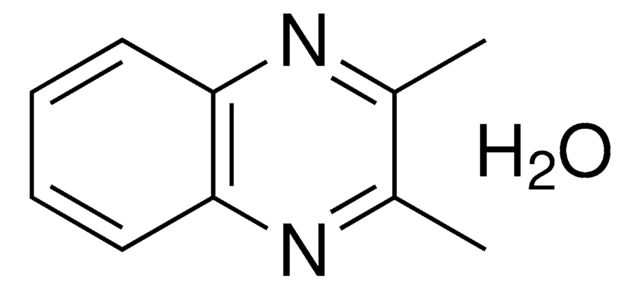Wichtige Dokumente
M80202
2-Methylquinoxalin
97%
About This Item
Empfohlene Produkte
Assay
97%
Form
liquid
Brechungsindex
n20/D 1.613 (lit.)
bp
245-247 °C (lit.)
Dichte
1.118 g/mL at 25 °C (lit.)
SMILES String
Cc1cnc2ccccc2n1
InChI
1S/C9H8N2/c1-7-6-10-8-4-2-3-5-9(8)11-7/h2-6H,1H3
InChIKey
ALHUXMDEZNLFTA-UHFFFAOYSA-N
Suchen Sie nach ähnlichen Produkten? Aufrufen Leitfaden zum Produktvergleich
Signalwort
Warning
H-Sätze
Gefahreneinstufungen
Eye Irrit. 2 - Skin Irrit. 2 - STOT SE 3
Zielorgane
Respiratory system
Lagerklassenschlüssel
10 - Combustible liquids
WGK
WGK 3
Flammpunkt (°F)
224.6 °F - closed cup
Flammpunkt (°C)
107 °C - closed cup
Persönliche Schutzausrüstung
Eyeshields, Gloves, type ABEK (EN14387) respirator filter
Hier finden Sie alle aktuellen Versionen:
Analysenzertifikate (COA)
Die passende Version wird nicht angezeigt?
Wenn Sie eine bestimmte Version benötigen, können Sie anhand der Lot- oder Chargennummer nach einem spezifischen Zertifikat suchen.
Besitzen Sie dieses Produkt bereits?
In der Dokumentenbibliothek finden Sie die Dokumentation zu den Produkten, die Sie kürzlich erworben haben.
Unser Team von Wissenschaftlern verfügt über Erfahrung in allen Forschungsbereichen einschließlich Life Science, Materialwissenschaften, chemischer Synthese, Chromatographie, Analytik und vielen mehr..
Setzen Sie sich mit dem technischen Dienst in Verbindung.









